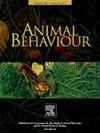Navigating the night: effects of artificial light on the behaviour of Atlantic puffin fledglings
IF 2.3
2区 生物学
Q2 BEHAVIORAL SCIENCES
引用次数: 0
Abstract
Every year in Newfoundland, young Atlantic puffins, Fratercula arctica, departing their nests at night for the first time become stranded in towns near their breeding colonies, a phenomenon thought to be caused by attraction towards artificial light. To test this hypothesis, we conducted three behavioural experiments. First, we illuminated beaches near a breeding colony to determine whether more fledglings would become stranded in illuminated versus dark conditions. Next, we conducted a Y-maze experiment to test stranded fledglings for phototactic behaviour in general and for preferences among high-pressure sodium (HPS), Warm white light-emitting diode (LED), Cool white LED, Blue LED and Orange LED light. Lastly, we quantified activity levels of stranded fledglings in an open field test during exposure to several different light types. We found significantly more fledglings stranded when beaches were illuminated, and fledglings significantly preferred light over darkness in the Y-maze, supporting our hypothesis that Atlantic puffin fledglings become stranded due to light attraction. Fledglings displayed no preferences for certain light types over others in the Y-maze, potentially suggesting that strandings in this species may not be mitigable by changing the streetlight type in stranding-prone towns. Interestingly, fledglings exhibited higher activity levels in darkness and HPS light than in LED light, potentially holding implications for rescue, rehabilitation and husbandry programmes. Overall, our findings demonstrate that the only evidence-based strategy for the reduction of Atlantic puffin strandings is the reduction of coastal artificial lighting; however, further research is needed to determine whether aspects of artificial light besides bulb type may be altered to effectively reduce light attraction in this species.
夜间导航:人造光对大西洋海雀雏鸟行为的影响
每年在纽芬兰,第一次在夜间离巢的大西洋海雀(Fratercula arctica)幼鸟都会在繁殖地附近的城镇搁浅,这种现象被认为是受到人造光的吸引所致。为了验证这一假设,我们进行了三个行为实验。首先,我们照亮了繁殖地附近的海滩,以确定在光照条件下与黑暗条件下是否会有更多的雏鸟搁浅。接着,我们进行了一个Y型迷宫实验,测试搁浅雏鸟的一般趋光行为,以及它们对高压钠灯(HPS)、暖白光发光二极管(LED)、冷白光发光二极管、蓝光发光二极管和橙光发光二极管的偏好。最后,我们对搁浅的雏鸟在暴露于几种不同光照类型时的活动水平进行了量化。我们发现,当海滩上有灯光时,搁浅的雏鸟数量明显增加,而且在Y型迷宫中,雏鸟明显偏好光而不是黑暗,这支持了我们的假设,即大西洋海雀雏鸟是由于光的吸引而搁浅的。在Y型迷宫中,雏海雀没有表现出对某些光线类型的偏好,这可能表明,在容易发生搁浅的城镇,改变路灯类型可能无法缓解该物种的搁浅。有趣的是,雏鸟在黑暗和 HPS 灯光下比在 LED 灯光下表现出更高的活动水平,这可能会对拯救、康复和饲养计划产生影响。总之,我们的研究结果表明,减少大西洋海雀搁浅的唯一有据可依的策略是减少沿海人工照明;然而,还需要进一步研究,以确定除了灯泡类型外,是否还可以改变人工照明的其他方面,以有效减少该物种的光吸引力。
本文章由计算机程序翻译,如有差异,请以英文原文为准。
求助全文
约1分钟内获得全文
求助全文
来源期刊

Animal Behaviour
生物-动物学
CiteScore
4.60
自引率
8.00%
发文量
236
审稿时长
10.2 weeks
期刊介绍:
Growing interest in behavioural biology and the international reputation of Animal Behaviour prompted an expansion to monthly publication in 1989. Animal Behaviour continues to be the journal of choice for biologists, ethologists, psychologists, physiologists, and veterinarians with an interest in the subject.
 求助内容:
求助内容: 应助结果提醒方式:
应助结果提醒方式:


